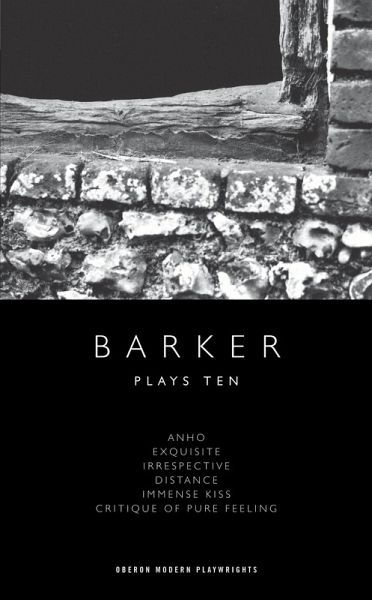
Howard Barker: Plays Ten (eBook, ePUB)
Versandkostenfrei!
Sofort per Download lieferbar
18,95 €
inkl. MwSt.
Weitere Ausgaben:

PAYBACK Punkte
9 °P sammeln!
The tenth collection of plays by Howard Barker, one of the most significant and controversial dramatists of our time. His plays challenge, unsettle and expose. Plays Ten comprises the plays Ahno, Distance, Critique of Pure Feeling, Irrespective, Immense Kiss, Exquisite. In Ahno, A Prince of Now, a youthful dictator is revealed as simultaneously revolutionary and reactionary, in politics and in love. His shocking efforts to create a new social order are mirrored in his unconventional passion for a seventy-five year old woman, who along with his devoted commissar, a group of fanatical priests, a...
The tenth collection of plays by Howard Barker, one of the most significant and controversial dramatists of our time. His plays challenge, unsettle and expose. Plays Ten comprises the plays Ahno, Distance, Critique of Pure Feeling, Irrespective, Immense Kiss, Exquisite. In Ahno, A Prince of Now, a youthful dictator is revealed as simultaneously revolutionary and reactionary, in politics and in love. His shocking efforts to create a new social order are mirrored in his unconventional passion for a seventy-five year old woman, who along with his devoted commissar, a group of fanatical priests, and a disturbingly perceptive Dalmatian, make up a menacing court of activists. In Exquisite, Barker's theme is the ethical ambiguity of slavery. In a dimly feudal setting, but constantly referring to our time, unsolved murders decimate a stable community. The protagonist, a loyal and uncritical serf, declines to speculate on the cause, whilst at the same time possessing the power to put an end to it. His ambiguous relationship with authority, and his refusal to quarrel with his own status, reveals Barker's heretical manner with moral platitudes. Alongside full-scale and even epic dramas, Barker has always written short works for small casts. In Distance he views the horrors of The Great War from an unusual perspective, that of the mother of a killed son, who arrives at her own philosophy of mourning. In Irrespective, a reclusive intellectual - in his final years - finds himself pestered for moral teaching by a wretched populace which has hitherto ignored him. In Critique of Pure Feeling, an old woman, sceptical of love but not of property, finds herself recklessly participating in an erotic duel. Immense Kiss, one of Barker's most terrible visions, takes place as an army enters a besieged city, where a young conscript, discovering a woman abandoned in a room, finds himself stretched between longing and civility.













